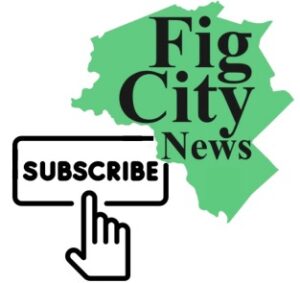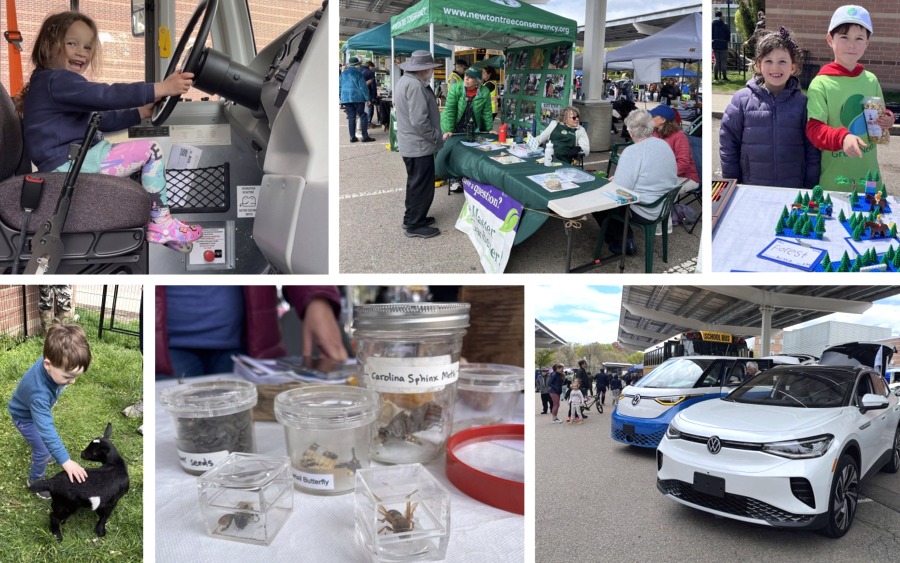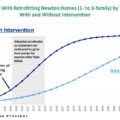Even though it looked like a classic yellow school bus, the vehicle on display at the city’s Earth Day festival on Sunday doesn’t spew smoke from its exhaust; instead, it runs on electricity to transport students in a cleaner, more efficient way.
“We’re using it to prove the viability of electric student transportation,” said Mike Callendar, general manager of Doherty’s Garage, a school bus operator. “It’s much more efficient in maintenance and repair costs and [is] lower in fuel cost.”

Doherty’s bus was part of an electric vehicle (EV) display outside Newton North High School, offering information to visitors who could also get a close-up look at several models.
In addition to examining EVs, festival attendees could learn about a wide variety of eco-friendly services, products, and organizations during the fourth-annual event organized by GreenNewton, Newton Climate Action, and the Newton EV Task Force and sponsored by several other groups.

“I think it’s a great opportunity to be together … and think about what impact we can make [on the environment] as a community and individually,” said Judy Lehrer Jacobs, GreenNewton’s executive director. An hour into the event, she estimated that several hundred people had already stopped by and she anticipated attendance might be up to several thousand before the end of the day.

The rows of booths offered useful information on how to help local pollinators thrive (Newton Conservators); ways to combat food insecurity (Newton Community Farm); and products that can help people go green, to name a few. Along with gathering handouts, attendees could grab some snacks and listen to live music.


Children were drawn to a table with plenty of LEGOs and an enclosure with tiny goats.
“Kids like kids,” joked John Bennett, owner of Goats of Dover, as he stood with the four animals.
“We’re having a lot of fun,” said Gordon Kraft-Todd, whose son Isaac Todd, 4, gently patted one of the furry critters.
As several youngsters smiled and interacted with the small 15-day-old and 1-year-old animals, Bennett explained how the lively creatures benefit the environment.
Bennett said that his larger goats are used to clear the land of invasive species, safely munching plants harmful to the environment at commercial and residential locales while simultaneously fertilizing the soil.

Once children finished playing with the animals, they could use their creativity at the LEGO table, either building green environments or drawing pictures.

The Clay siblings — Thomas, 9, and Caroline, 7 — whose grandparents are members of GreenNewton, came up with the idea to run a LEGO booth after learning about climate change.
Several other stations highlighted Newton’s many environmental nonprofits offering information on how locals can get involved in the movement to go green.

Touting the “benefits of living in and walking around Newton,” Susan Haule, a member of the all-volunteer Newton Conservators, provided attendees with information on the many walks organized by the group. These include a Signs of Spring ramble in Webster Woods (May 10), a Mother’s Day bird walk in Nahanton Park (May 11), an exploration of Hemlock Gorge (May 18), a stroll through Cold Spring Park (May 24), and a pollinator Bioblitz in Edmands Park (June 7), among other activities.

A few other groups, including the Newton Community Farm and the Charles River Food Co-op, featured initiatives on food security and food justice.
Co-op board member Rachel Meyers of Newton said the group is in the development process, with 930 members so far. She said that the co-op is getting ready to kick off a fundraising campaign and looking for a shop location, explaining that a co-op is “a grocery store that is owned and operated by it’s members,” who have a say in the decision-making process.
The Newton Community Farm, which will mark its 20th anniversary in 2026, will hold a free event on Thursday, May 1, from 7PM to 8:30PM at UMass-Mt. Ida Campus, called Food for all: The challenges and opportunities for feeding our community.








